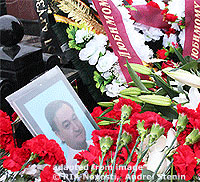Lavrov: Magnitsky act ‘Russophobia’ product

(Interfax – MOSCOW, April 11, 2013) Russian Foreign Minister Sergei Lavrov has branded the U.S. Sergei Magnitsky Rule of Law Accountability Act as a manifestation of “the Russophobia that is traditionally present” in U.S. Congress.
One of the architects of the Magnitsky act was Hermitage Capital investment fund chief executive William Browder, who “illegally hoarded a large fortune in the Russian Federation,” Lavrov told RTVi television.
“The Magnitsky Act is a patently anti-Russian move that was thought up, as far as one can judge, by people with a sophisticated knowledge of politics, and Browder, who illegally hoarded a large fortune in the Russian Federation, had a role in it,” Lavrov said.
“It just so happened that poor Magnitsky worked for him and the criminal action against Browder extended to his lawyer Magnitsky,” the minister said.
“Browder was extremely active in lobbying that act on Capitol Hill, and then he was rushing all over Europe and suggesting that anti-Magnitsky laws be passed in European parliaments,” Lavrov said.
“It’s very bad when people die in jail,” the minister said in reference to Magnitsky’s death at a Moscow detention center in November 2009. “Worst of all, the man couldn’t get a chance to prove that he was right or the other way round. It’s always bad, and not only when people die in our jails.”
However, the Magnitsky case “is our own problem,” Lavrov said.
He said that, at the behest of President Vladimir Putin, Russian Human Rights Commissioner Vladimir Lukin is working on ways to improve conditions in Russian prisons, especially those in pretrial detention centers.
Lavrov also said the Magnitsky act was a countermeasure to Russia’s removal from the American list of countries subject to restrictions in trade with the United States under the 1970s Jackson-Vanik amendment.
“When the Americans realized that they had to repeal the Jackson-Vanik amendment or otherwise they would forfeit advantages that the Russian accession to the World Trade Organization would give WTO member countries, they automatically had a desire to replace the anti-Soviet law with an anti-Russian one,” Lavrov said.
He said President Barack Obama’s administration had been against the Magnitsky Act.
“When Obama was meeting with (Russian President Vladimir) Putin at the G20 summit in Los Cabos in June last year, the American president said, I can’t avoid doing this. I will be under the pressure of circumstances, primarily the need to abolish the Jackson-Vanik amendment, which is something I’m determined to do,” Lavrov said.
“To an extent, I see the fact that Congress literally pressed through a version even more hard-line than what had initially been proposed by Benjamin Cardin (U.S. Senator who introduced the Magnitsky act) not only as a manifestation of the Russophobia that us traditionally present on Capitol Hill but also as a desire to put a spoke in President Obama’s wheel – Obama had consistently sought to make Russia one of his foreign policy priorities and considerable results have been achieved here,” Lavrov said.
This means that the Magnitsky act had to do with U.S. domestic politics as well, he argued.
